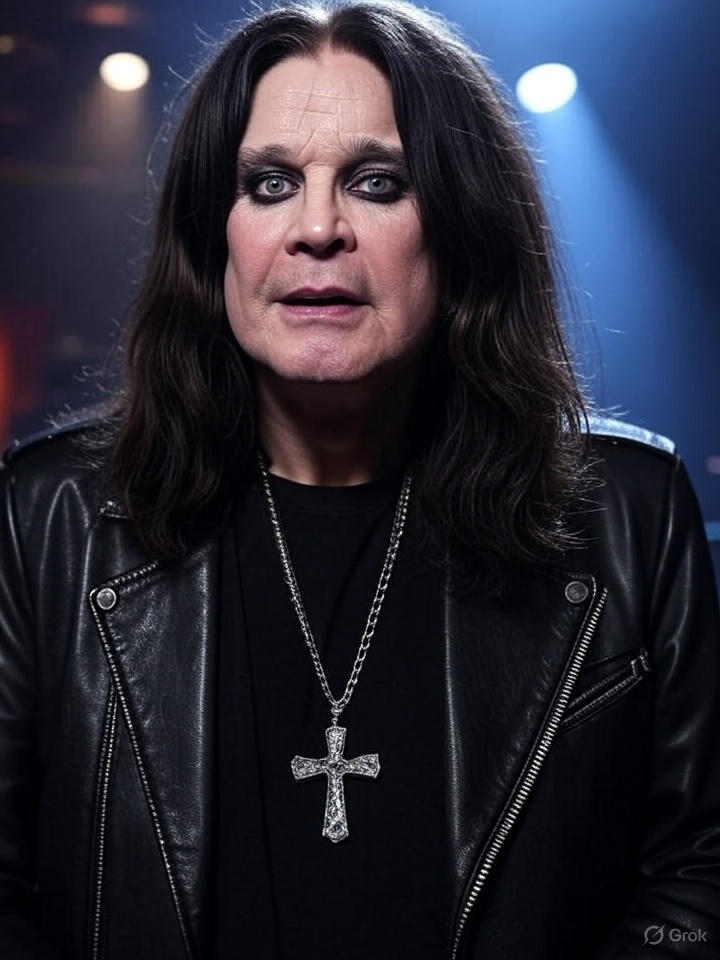John Michael “Ozzy” Osbourne (December 3, 1948 – July 22, 2025) was more than a rock star—he was a cultural phenomenon whose raw energy, theatrical flair, and unapologetic individuality redefined heavy metal and shaped modern music. Known as the “Prince of Darkness,” Osbourne’s career spanned over five decades, from his groundbreaking work with Black Sabbath to his prolific solo career and reality TV stardom. This article explores the life, music, and enduring impact of a man who became a legend by embracing his contradictions: a working-class hero, a family man, and a master of shock-rock spectacle.
Early Life and the Birth of Black Sabbath
Born in Aston, Birmingham, England, Osbourne grew up in a working-class family, one of six children in a cramped, post-war household. His early life was marked by hardship—poverty, a stint in prison for petty theft, and struggles with dyslexia. Music became his escape, inspired by The Beatles and the raw energy of 1960s rock. In 1968, Osbourne answered an ad for a singer placed by guitarist Tony Iommi and drummer Bill Ward, forming the band Polka Tulk Blues, which soon evolved into Black Sabbath, with bassist Geezer Butler completing the lineup.
Black Sabbath’s self-titled debut album in 1970 is widely credited with birthing heavy metal. Songs like Black Sabbath and N.I.B. introduced a dark, heavy sound, driven by Iommi’s detuned riffs and Osbourne’s haunting vocals. The 1970 follow-up, Paranoid, with hits like War Pigs, Iron Man, and the title track, cemented their legacy. Osbourne’s raw, emotive voice and the band’s doom-laden lyrics—often inspired by Butler’s interest in the occult—captured the anxieties of a post-war generation. Despite critical disdain, their albums topped charts, proving their universal appeal.
Solo Stardom and the Prince of Darkness Persona
By 1979, Osbourne’s struggles with addiction led to his departure from Black Sabbath. Undeterred, he launched a solo career with the support of manager Sharon Arden (later his wife). His 1980 debut, Blizzard of Ozz, featuring guitarist Randy Rhoads, was a triumph, with classics like Crazy Train and Mr. Crowley. Rhoads’ virtuosic playing and Osbourne’s theatrical delivery elevated the album to multi-platinum status. The follow-up, Diary of a Madman (1981), further showcased his ability to blend melody with menace.
Osbourne’s “Prince of Darkness” persona emerged through his provocative antics—most infamously biting the head off a bat during a 1982 concert (he thought it was fake) and urinating on the Alamo that same year, earning a temporary ban from San Antonio. These incidents, combined with songs exploring dark themes, fueled misconceptions about Satanism, which Osbourne repeatedly debunked, affirming his Christian faith and Church of England roots. His 1995 album Ozzmosis, featuring Perry Mason, reflected his knack for blending personal struggles (like rehab) with cultural references, though the song was inspired by TV reruns, not secret societies like Freemasonry, as some speculated.
Reality TV and Cultural Icon
In 2002, Osbourne became an unlikely household name through The Osbournes, a reality show on MTV that showcased his life with Sharon and their children, Kelly and Jack. The show humanized the rock legend, revealing a bumbling, lovable family man beneath the wild exterior. It ran for four seasons, earning an Emmy and introducing Osbourne to a new generation. His vulnerability—openly discussing addiction, health issues like Parkinson’s disease, and his love for Sharon—made him relatable, even as he remained a larger-than-life figure.
Osbourne’s later years saw continued musical output, including Ordinary Man (2020), featuring collaborations with Post Malone and Elton John, and Patient Number 9 (2022), which won a Grammy for Best Rock Album. His Ozzfest festival, launched in 1996, became a cornerstone of heavy metal, spotlighting bands like Slipknot and Marilyn Manson.
Legacy and Impact
Osbourne’s influence is immeasurable. Black Sabbath’s pioneering sound shaped genres from doom to nu-metal, while his solo work proved his versatility. His theatricality—crosses, gothic imagery, and raw charisma—inspired artists like Metallica and Rob Zombie. Beyond music, Osbourne challenged norms, embracing vulnerability in a genre often defined by machismo. His openness about addiction and mental health paved the way for discussions about these issues in rock culture.
When Osbourne passed on July 22, 2025, tributes poured in on platforms like X, with fans and musicians alike celebrating his defiance and authenticity. Posts highlighted his humor, resilience, and ability to connect across generations. Critics may have once dismissed him, but Osbourne’s journey from a Birmingham factory worker to a global icon proved his enduring power.
Ozzy Osbourne was no saint, but he was a survivor—a man who turned darkness into art, chaos into connection, and rebellion into a legacy that will echo for generations. The Prince of Darkness reigned not through perfection, but through his unapologetic humanity.
